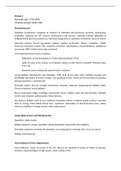Period 3
Romantic age: 1790-1830
Victorian period: 1830-1900
Romanticism pt1
Definition romanticism: Emphasis on freedom of individual self-expression, sincerity, spontaneity,
originality; replacing the 18th century neoclassicism (old classics), rejecting ordered rationality of
enlightenment; personal experience, individual imagination & aspiration; emotional; focus on nature
Historical context: French Revolution (Liberté, Egalité, Fraternité); literary revolution (1789);
American revolution ended 1783, industrial revolution (urbanization, industrialization); abolitionist
movement (1807, British slave trade outlawed)
Most important texts French revolution:
Reflections on the Revolutions in France (Edmund Burke 1970)
rights of man: is the answer to Mr Burke’s attack on the French revolution (Thomas Paine
1971-72).
Romantic poets enthusiastic about French revolution.
Lyrical Ballads: Wordsworth and Coleridge, 1798. Role of the poet: poet combines passion and
knowledge the empire of human society, man speaking to men. Poems are the overflow of powerful
feelings (emotions = romanticism)
Romantic writers did not consider themselves romantic. Unknown beginning/end (Blake’s birth,
French revolution, lyrical ballads?)
Big six male poets: blake, Coleridge, wordsworth, Byron, shelley, keats. But also females: charlotte
smith, mary robinson, Letitia landon, felicia hemans.
Key features ballads: basis in oral traditions of popular culture, relatively simple & direct, narrative
drive & energy, fixed ballad stanza form, (quatrains, alternation of four/three-beat lines, abcb),
refrain & repetition in longer poems, often supernatural
Goody Blake & Harry Gill (Wordsworth)
Repetition: teeth chatter,
Ballad symptoms: simple, repetition, almost gossip-like (sounds like oral tradition)
Romantic symptoms: everyday life situations, easy language for everyday men, focus on nature
Setting: contemporary
Mary Robinson & Poor Singing Dame
Mary Robinson: Career as actress in her 20s, attracts the attention of prince of Wales & becomes
mistress, important figure in high society, starts writing in 30s
, Works such as poems, thoughts on the condition of women, lyrical tales (1800) to respond
to lyrical ballads
The poor singing dame:
Response to goody blake and harry gill: differences: centrality of the female character, medieval
form, different approaches to ballad form
Mary Robinson knows what it’s like to be a woman in this period, so the poem reflects this: Mary
shares name w the main character in poor singing dame. In goody Blake and harry gill, goody says
harry is cold and he is. in poor singing dame, the lord wants Mary dead just for her being happy.
Women aren’t allowed to express their emotions and desires.
Gothic poem symptoms: dark castle & atmosphere, villain (lord), omens (the owls)
Romantic symptoms: nature focus (dark and edgy for the lord, sunny and nice for the dame) &
nature embraces the dame’s house and grave but attacks the lord, simple language.
The rime of the ancient mariner (Coleridge):
Ballad symptoms: abcb, quatrains
Romantic symptoms: focused on the individual (mariner’s glittering eyes, his hand is described), the
past (retellings of the mariners story), repetition of the description of the mariner (especially the
eyes)
Themes: the natural world, the spiritual world (wedding guest thinks mariner is a spirit, souls flying
from bodies mentioned in the text) religion, imprisonment (in loneliness), retribution (for killing the
albatross), sins & forgiveness
Allegory because: story within a story (i.e., the mariner’s retellings within the wedding)
Albatross: personification of hope, showed the way in their waters, killed by the mariner, mariner
has to pay
Romanticism pt 2
Percy Bysshe Shelley calls wordsworth the “poet of nature” in “to wordsworth” (1816).
Loss of faith in earlier generation because:
1. wordsworth accepts position as tax collector in Westmoreland 1813, no longer living in
honoured poverty.
2. 1820s onwards wordsworth becomes great literary celebrity, his home becomes tourist
attraction (feeling of betrayal).
3. Coleridge’s increasing conservativism. 4. STC becomes celebrity as lecturer & critic
Popular radicalism: 1810s and 1820s literary trend
Events that encouraged popular radicalism:
the luddite, machine breaking riots (1811-1812)





